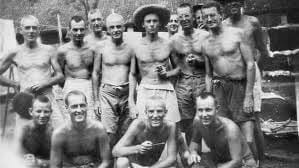
25 Mar POW Middlemen
The reputation of the middle man is not positive. Their perception in the market is to buy low and sell high without improving the product. Supply chain revolutionaries are always seeking to bypass the middleman to recapture this misplaced value, yet the value chain functionality holds fast. Why is this?
An interview by Russ Roberts to Mike Munger in Oct 2008 draws upon the experiences noted in RA Redford’s “Economica”, 1945 Vol 12 pp 189-201: The Economic Organisation of a POW Camp. This WWII POW camp was like many others, a micro human ecology operating in a purely confined environment whereby the inputs (food) were a fixed weekly quantum and noted as a scarce resource.
The social anatomy of the camp was predictable, every inmate received the same unified parcel of food within their Red X pack every week. There was bully beef, carrots, some chocolate, cigarettes, toilet paper etc. But everyone had different preferences. Some were non-smokers, some were allergic to chocolate and some were vegetarian. The utility received by each inmate was not a fixed standard but varied according to their individual preferences.
Now voluntary exchange can only happen if the utility of each stakeholder participating in the exchange increases. But in certain environments it is impossible to ascertain everyone’s utility requirements due to communication inefficiencies. Hence, the middleman.
Enter into the story, the Itinerant Padre. The onsite Anglican Priest had access to all POW inmates. He made it his mandate to ascertain everyone’s appetite for preference and facilitated exchange within the camp according to their demands. By the end of the day, the Itinerant Padre had traded multiple products across multiple participants and out of the process managed to procure for himself 2.5 Red X packs.
Economists argue how can this be so? How can the Priest extract items from the limited pool of commodities during exchange? Was overall welfare increased? Did he rip off the constituents?
The analysis on this POW camp demonstrates that trade or exchange is NOT a zero sum game. A zero sum game means for every win there is a loss. There was no leakage in the system, it was a closed trading environment with a fixed set of products. Everyone traded voluntarily to increase their personal welfare which then generated surplus product for the Priest. The priest took on risk in partaking the exercise, extracted value from his research and intellectual property and created liquidity in the market for product. Carefully noting that there was no “value adding” to any of the physical product during the course of exchange.
The priest created an emerging infrastructure for trade and exchange founded on information. All of us in business, whether employees at a bank, running a business, providing advisory services are all middlemen. Either value adding the physical product or providing a service founded on knowledge, all of which increases the utility of a consumer when voluntarily traded. The middleman is not a Bogie, but a necessary function of the specialised value chain that functions in our closed economy: planet Earth.



Sorry, the comment form is closed at this time.